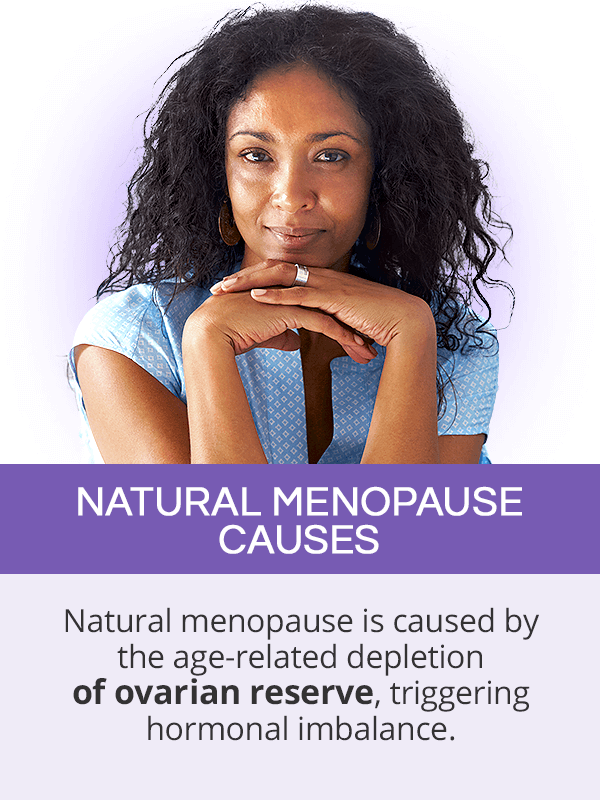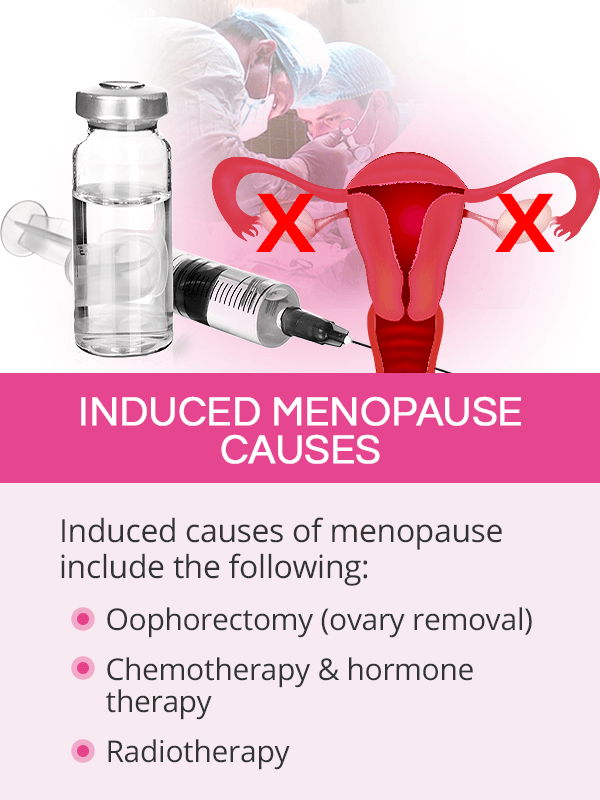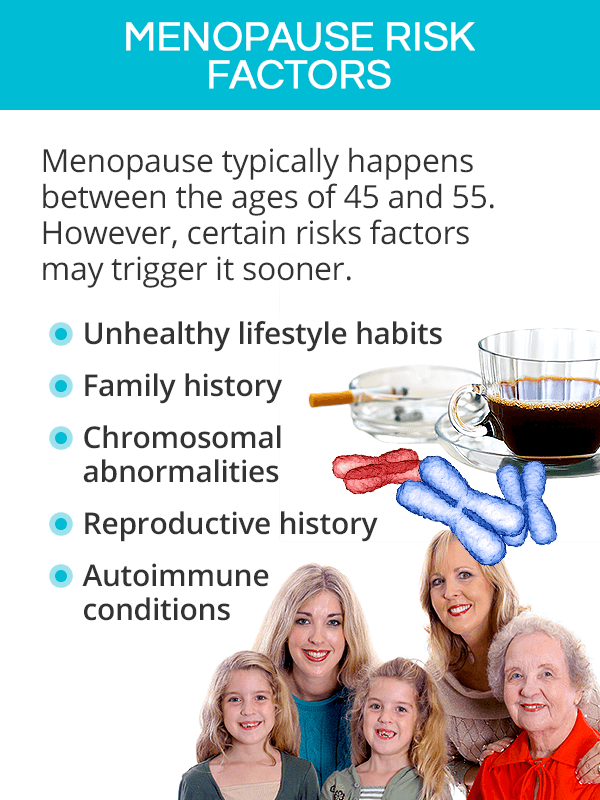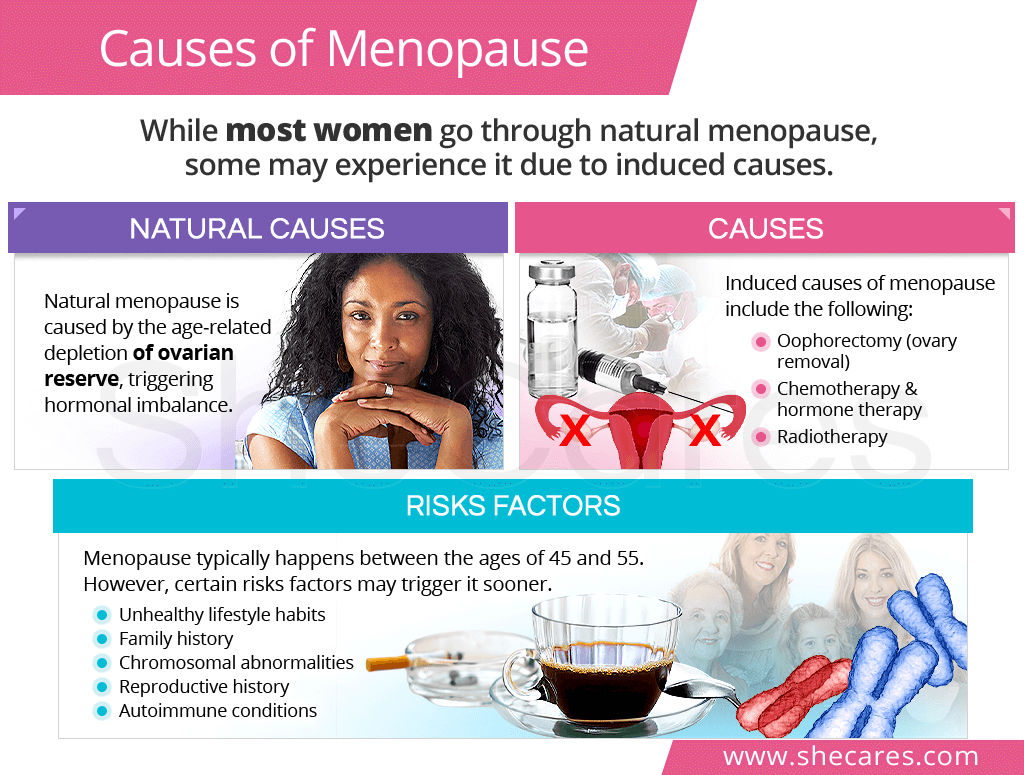Natural Menopause Causes

The majority of women go through natural menopause. This means that the end of their reproductive functions take place due to natural, biological causes, not a surgical or pharmacological intervention.
The main cause of natural menopause is the age-related depletion of a woman's ovarian reserve, triggering hormonal imbalance.
Ovarian Egg Depletion
Ovarian reserve is the ability of the ovaries to produce viable oocytes (eggs) that can be released on ovulation and used for conception. The state of one's ovarian reserve depends on two characteristics: egg quantity and quality.
Egg quantity. Women are born with a lifetime supply of eggs. Throughout life, their number gradually decreases at various speeds until it reaches depletion at menopause.
Egg quality. At the same time, egg quality - that is, their DNA composition - is affected by the aging process, leading to chromosomal abnormalities within the eggs, which render them unviable for conception.
Hormonal Fluctuations during Menopause
As aforementioned, depleting ovarian reserve triggers massive hormonal fluctuations, marking the onset of perimenopause.
The eggs in the ovaries are stored in follicles, which support their growth and maturation. Follicles produce estrogen in the first part of the menstrual cycle. Upon ovulation, the follicle that released the egg produces progesterone.
With the decline of eggs (followed by their eventual depletion), ovarian hormone production becomes erratic and, then, permanently halts. This is when a woman's fertility ends, and she has reached menopause: there is no more ovulation, no more periods, and no more chances for natural pregnancy.
Induced Menopause Causes

Some women may undergo induced menopause, which may be due to surgery as well as radio- or chemotherapy.
Menopause due to Surgery
Surgical menopause is menopause that results from bilateral oophorectomy, a surgical removal of both ovaries. Women may undergo an oophorectomy for endometriosis, tubo-ovarian abscesses, ovarian cancer, and other conditions.
Since ovaries produce the majority of estrogen and progesterone, their surgical removal causes abrupt and permanent menopause with intense menopause symptoms, including hot flashes, memory lapses, and loss of libido.
Menopause due to Cancer Treatment
Cancer treatments may also be the cause of menopause. This includes radiation therapy to the pelvis as well as chemotherapy and some forms of hormone therapy, which may disrupt ovarian function. In most cases, their effects are not as abrupt as those of surgical menopause.
This type of induced menopause is not permanent for all women. Whether or not a woman's ovaries restore their functions after chemo- or radiotherapy may depend on her age as well as treatment type, dosage, and duration.
Menopause Risk Factors

All woman will inevitably go through menopause. While most reach it between the ages of 45 and 55, it is impossible to know when exactly it will happen.1
However, several studies have identified various menopause risk factors that may trigger its arrival.2,3,4,5,6 They are as follows:
Reproductive history. Having given birth to several children has been associated with going through menopause at a later age and having a longer reproductive life span.
Family history. Studies have shown that one's age at menopause is generally similar to that of one's mother, sister, or grandmother. This is also true for those family members who have entered menopause early or prematurely.
Chromosomal abnormalities. Certain abnormalities that cause conditions such as Turner's syndrome or Fragile X can lead to the onset of menopause outside of the typical age.
Lifestyle habits. Unhealthy practices, like smoking, alcohol, and excess caffeine, may cause menopause at a younger age. Likewise, regular exercise and higher intakes of fruits, protein, and carbs have shown to delay menopause.
Autoimmune conditions. Women suffering from inflammatory bowel disease, rheumatoid arthritis, lupus, and other autoimmune conditions may experience early menopause.
Key Takeaways
Menopause is an integral part of every woman's life. When it occurs naturally, the main cause of menopause is the gradual depletion of ovarian eggs and the hormonal imbalance it triggers. Once the egg pool is empty, the ovaries no longer produce estrogen and progesterone, and a woman's fertility is permanently ended. In some cases, however, menopause causes may include surgery, medications (e.g. chemotherapy), or radiotherapy. Such instances are referred to as induced menopause. Additionally, studies have identified several menopause risk factors that may trigger its onset at a younger age. These include unhealthy lifestyle practices, genetics, and autoimmune conditions, among others.
Sources
- Breast Cancer. (2021). How Menopause Can Happen with Breast Cancer Treatments. Retrieved March 4, 2021 from https://www.breastcancer.org/tips/menopausal/types/treatment-induced
- Canadian Cancer Society. (n.d.). Treatment-induced menopause. Retrieved March 4, 2021 from https://www.cancer.ca/en/cancer-information/diagnosis-and-treatment/managing-side-effects/treatment-induced-menopause/?region=on
- Cleveland Clinic. (2019). Menopause, Perimenopause and Postmenopause. Retrieved March 4, 2021 from https://my.clevelandclinic.org/health/diseases/15224-menopause-perimenopause-and-postmenopause
- Mayo Clinic. (2020). Menopause. Retrieved March 4, 2021 from https://www.mayoclinic.org/diseases-conditions/menopause/symptoms-causes/syc-20353397
- Mayo Clinic. (2020). Oophorectomy (ovary removal surgery). Retrieved March 4, 2021 from https://www.mayoclinic.org/tests-procedures/oophorectomy/about/pac-20385030
- Medicina. (2019). Surgically induced menopause - a practical review of literature. Retrieved March 4, 2021 from https://www.ncbi.nlm.nih.gov/pmc/articles/PMC6722518/
- Medline Plus. (2021). Menopause. Retrieved March 4, 2021 from https://medlineplus.gov/menopause.html
- National Institute on Aging. (2017). What is Menopause? Retrieved March 4, 2021 from https://www.nia.nih.gov/health/what-menopause
- NHS. (2018). Menopause. Retrieved March 4, 2021 from https://www.nhs.uk/conditions/menopause/
- Office on Women's Health. (2019). Menopause. Retrieved March 4, 2021 from https://www.womenshealth.gov/menopause
- The North American Menopause Society. (n.d.). Menopause FAQs: Premature, Early, and Induced Menopause. Retrieved March 4, 2021 from https://www.menopause.org/for-women/menopause-faqs-premature-early-and-induced-menopause
- University of Rochester Medical Center. (n.d.). Life After Cancer: Menopause After Treatment. Retrieved March 4, 2021 from https://www.urmc.rochester.edu/encyclopedia/content.aspx?contenttypeid=34&contentid=16117
Footnotes:
- National Institute on Aging. (2017). What is menopause? Retrieved March 4, 2021 from https://www.nia.nih.gov/health/what-menopause
- Menopause. (2009). Dietary and lifestyle predictors of age at natural menopause and reproductive span in the Shanghai Women's Health Study. Retrieved March 4, 2021 from https://www.ncbi.nlm.nih.gov/pmc/articles/PMC2615483/
- Journal of Mid-Life Health. (2014). Lifestyle and dietary factors determine age at natural menopause. Retrieved March 4, 2021 from https://www.jmidlifehealth.org/article.asp?issn=0976-7800;year=2014;volume=5;issue=1;spage=3;epage=5;aulast=Sapre
- Maturitas. (2000). Factors associated with early menopause. Retrieved March 4, 2021 from https://pubmed.ncbi.nlm.nih.gov/10802394/
- Journal of Preventive Medicine & Public Health. (n.d.). Effects of Smoking on Menopausal Age: Results from the Korea National Health and Nutrition Examination survey, 2007 to 2012. Retrieved March 4, 2021 from https://www.jpmph.org/journal/view.php?doi=10.3961/jpmph.15.021
- Indian Journal of Medical Research. (2012). Chromosomal abnormalities & oxidative stress in women with premature ovarian failure (POF). Retrieved March 4, 2021 from https://www.ncbi.nlm.nih.gov/pmc/articles/PMC3307192/
